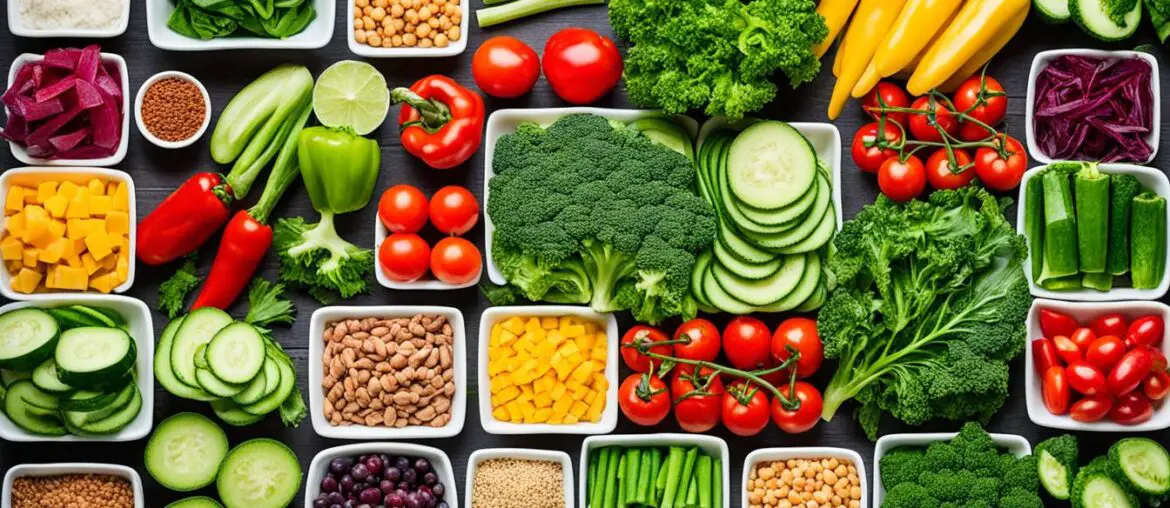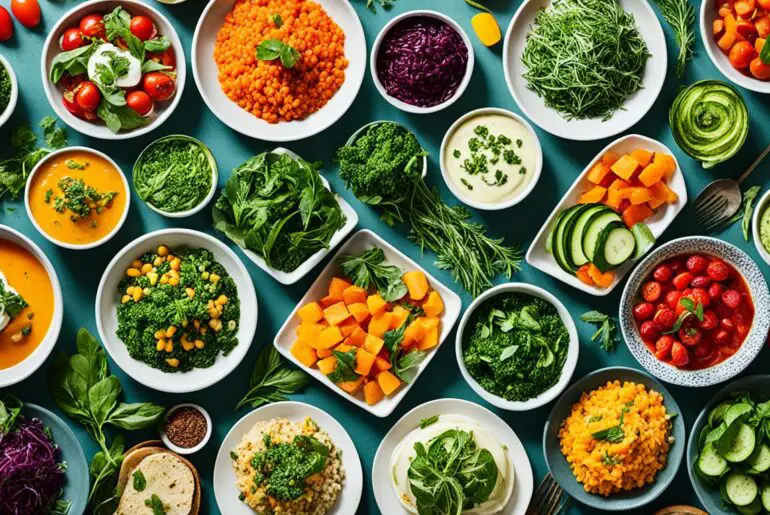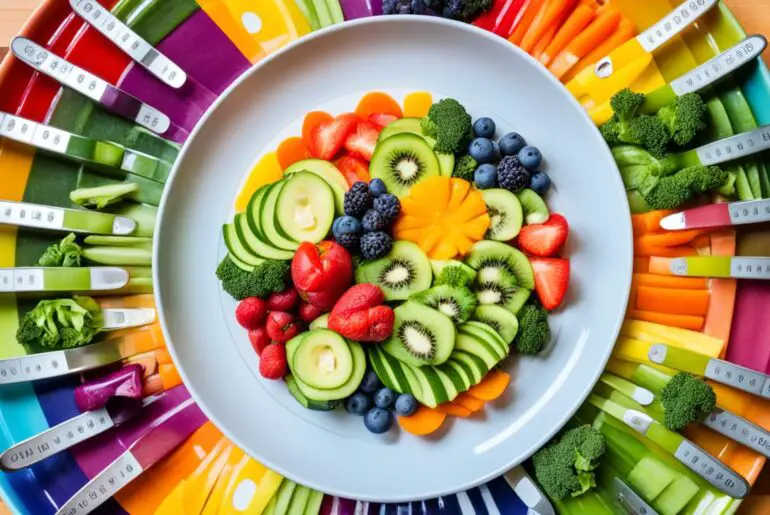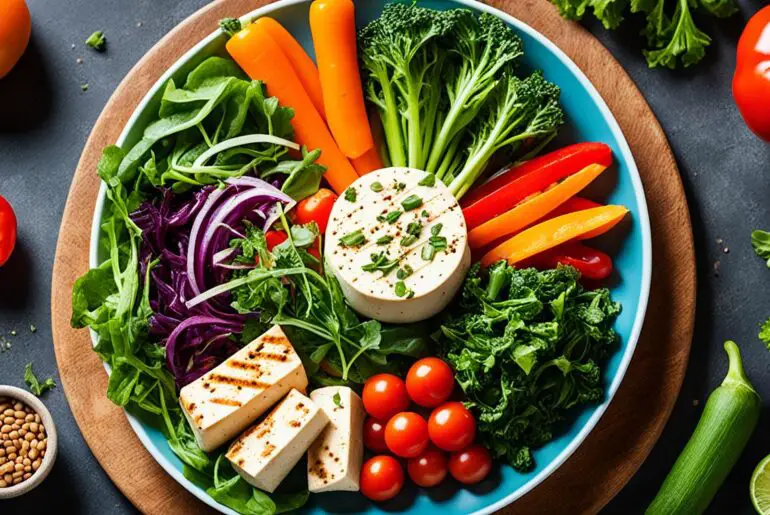Are you a vegetarian considering the HCG diet for weight loss? You may be wondering if the two lifestyles are compatible. The HCG diet, known for its rapid weight loss results, heavily relies on lean animal proteins in its original protocol. But can vegetarians successfully adapt this diet to meet their dietary preferences? Let’s explore whether the HCG diet and vegetarianism can coexist, and how you can make it work for you.
Key Takeaways:
- Modifying the HCG diet to align with a vegetarian lifestyle presents challenges, but it’s possible with proper planning and substitutions.
- Vegetarians face challenges in meeting their protein needs and avoiding nutrient deficiencies while following the HCG diet.
- There are vegetarian protein options available for the HCG diet, such as dairy products, soy products, and protein powders.
- Sample vegetarian meal ideas for the HCG diet include scrambled egg whites and vegetables, edamame salad, tofu vegetable stir-fry, and cottage cheese with approved fruits and vegetables.
- While some vegetarians may choose to pursue the HCG diet, most healthcare providers do not recommend it due to the risks of very low-calorie intake and potential nutrient deficiencies.
Overview of the HCG Diet
The HCG diet, developed by Dr. Albert T.W. Simeons in the 1950s, is a weight loss program that combines a very low-calorie diet with daily injections of HCG hormone. Advocates of the diet claim that it can result in rapid weight loss of 1-2 pounds per day.
The HCG diet primarily focuses on lean proteins, non-starchy vegetables, limited fruit servings, and the elimination of sugars, starches, and high-fat foods. It is designed to restrict calorie intake to 500 calories per day, which is below the recommended daily calorie requirement for most individuals.
In Dr. Simeons’ original protocol, HCG hormone injections were believed to stimulate the body’s metabolism and enable it to burn stored fat more efficiently. The combination of low-calorie intake and hormone injections was thought to facilitate rapid weight loss.
However, it’s important to note that the HCG diet is not without controversy. Many healthcare professionals question its effectiveness and safety, particularly the long-term sustainability of such a low-calorie diet. The FDA has also stated that over-the-counter HCG products for weight loss are illegal and potentially dangerous.
Despite these concerns, some individuals still choose to pursue the HCG diet for its claimed benefits. It is essential, however, that anyone considering the diet consults with a healthcare professional before starting and closely monitors their health throughout the process.
Challenges of a Vegetarian HCG Diet
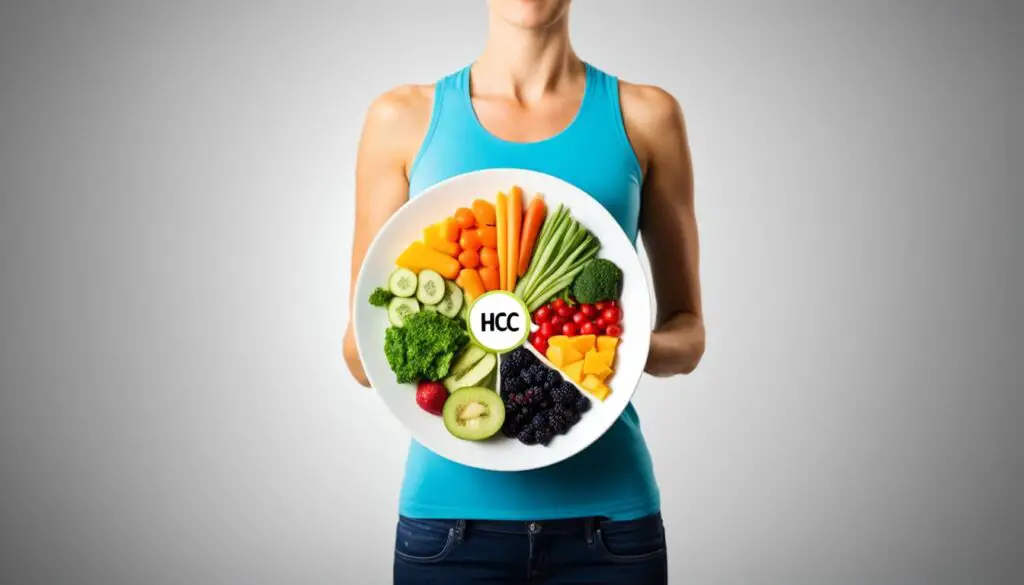
When it comes to following the HCG diet, vegetarians face unique challenges that can make adhering to the diet more difficult. These challenges primarily revolve around two key areas: obtaining an adequate intake of lean protein and ensuring the avoidance of potential nutrient deficiencies.
“Following the HCG diet as a vegetarian requires careful planning and consideration.”
The HCG diet emphasizes the consumption of lean protein, which typically comes from animal sources. For vegetarians, who abstain from meat, finding suitable protein alternatives can be a struggle. The diet’s protein requirements can be particularly challenging to meet without the inclusion of meat sources.
Furthermore, the elimination of most vegetarian protein sources, such as beans and seeds, can lead to potential nutrient deficiencies. Key nutrients like iron, zinc, and vitamin B12, which are commonly found in these protein sources, may be lacking in a vegetarian HCG diet. It is crucial for vegetarians to develop a well-planned meal strategy to compensate for these potential deficiencies.
Strategies for overcoming the challenges
Vegetarians who wish to pursue the HCG diet can employ several strategies to navigate these challenges:
- Explore alternative protein sources: Vegetarians can incorporate dairy products like fat-free milk, low-fat cottage cheese, and Greek yogurt into their HCG diet. They can also turn to soy products such as tofu and tempeh for additional protein options.
- Utilize protein powders: Supplementing with protein powders can be an effective way to increase protein intake. Soy, pea, or rice protein powders can easily be incorporated into vegetarian HCG diet plans to boost protein levels.
By carefully planning their meals and incorporating these strategies, vegetarians can overcome the challenges associated with the HCG diet and ensure that their nutritional needs are met.
Vegetarian Protein Options for HCG Diet
Following the HCG diet as a vegetarian may seem challenging due to the restrictions on many protein sources like beans and seeds. However, there are still viable options available to ensure you meet your protein needs and successfully navigate the diet.
One excellent source of vegetarian protein is dairy products. Include fat-free milk, low-fat cottage cheese, and Greek yogurt in your meal plan. These options are rich in protein and can be incorporated into various recipes and snacks.
Soy products such as tofu and tempeh are also valuable protein sources for vegetarians on the HCG diet. In addition to being high in protein, they are versatile and can be cooked in different ways to add flavor and variety to your meals.
Another option to consider is protein powders. Soy, pea, and rice protein powders can be easily mixed into shakes or added to recipes to increase your protein intake. They provide a convenient and quick way to meet your protein goals on the HCG diet.
When following the HCG diet as a vegetarian, it’s crucial to explore these protein-rich alternatives to ensure you maintain a balanced and nutritious meal plan. By incorporating dairy products, soy products, and protein powders, you can meet your protein requirements and stay on track with your vegetarian lifestyle.
Sample Vegetarian HCG Diet Meals
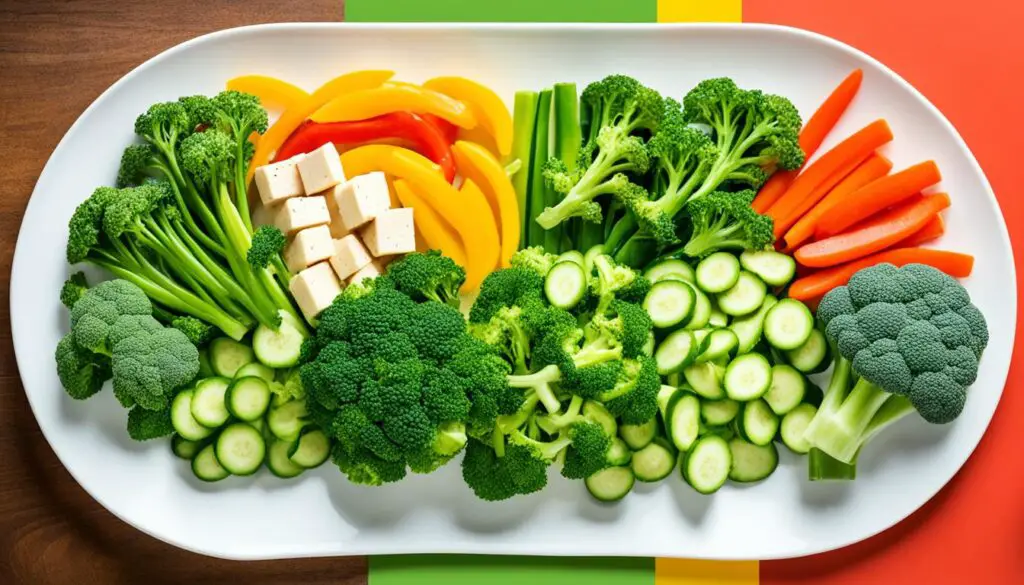
Planning meals for the HCG diet as a vegetarian can be challenging, but with creativity and careful consideration, it is possible to adhere to the program. Here are some sample vegetarian meal ideas for the HCG diet:
- Breakfast: Scrambled egg whites and a medley of colorful vegetables, such as bell peppers, spinach, and mushrooms. This protein-rich breakfast will keep you satiated throughout the morning.
- Lunch: Enjoy a refreshing edamame salad with juicy tomatoes, crisp cucumbers, and a light dressing. Edamame provides a good source of plant-based protein and complements the HCG diet requirements.
- Dinner: Stir-fry tofu and a variety of your favorite vegetables, like broccoli, zucchini, and carrots, in a flavorful sauce. Serve it over cauliflower rice for a low-calorie, nutrient-packed dinner option.
For snacks on the HCG diet, you can try cottage cheese topped with approved fruits and vegetables, such as sliced strawberries or cucumber rounds. These snacks provide additional protein and satisfy your craving for a nutritious bite between meals.
Tips for Creating Vegetarian HCG Diet Meals
When planning your vegetarian meals on the HCG diet, here are some extra tips to keep in mind:
- Focus on low-calorie, high-protein ingredients to meet the requirements of the HCG diet.
- Experiment with different vegetables, herbs, and spices to add flavor and variety to your meals.
- Consider incorporating HCG diet-approved protein powders or shakes to supplement your protein intake.
- Explore vegetarian HCG diet recipes available online or in specialized cookbooks for inspiration and new ideas.
“With proper planning and innovative meal ideas, vegetarians can successfully adapt the HCG diet to their dietary preferences.”
By following these guidelines and creating well-balanced vegetarian HCG diet meals, you can achieve your weight loss goals while adhering to your vegetarian lifestyle.
Making the HCG Diet Work as a Vegetarian
To successfully follow the HCG diet as a vegetarian, careful planning is crucial. As a vegetarian, I understand the challenges of adapting this diet to meet our dietary preferences. Here are some strategies and tips to make the HCG diet work for us:
1. Track your protein intake
Protein is an important nutrient during the HCG diet, as it helps maintain muscle mass and keeps you feeling full. As a vegetarian, it’s essential to ensure you’re getting enough protein from plant-based sources. Keep a food diary and track your protein intake to make sure you’re meeting your daily requirements.
2. Plan meals and snacks in advance
Meal planning is key to successfully following the HCG diet as a vegetarian. Plan your meals and snacks in advance to avoid any last-minute temptations or compromises. Look for creative vegetarian recipes that align with the HCG diet guidelines and add them to your meal plan.
3. Incorporate protein shakes if needed
If you’re struggling to meet your protein needs solely through plant-based foods, consider incorporating protein shakes into your diet. Look for high-quality vegetarian protein powders and add them to your favorite smoothies or shakes to increase your protein intake.
4. Look for HCG vegetarian recipes
To keep your meals interesting and flavorful, search for HCG vegetarian recipes online or in cookbooks. These recipes are specifically designed to meet the requirements of the HCG diet while providing delicious vegetarian options. Experiment with different flavors and ingredients to keep your meals exciting.
5. Join vegetarian HCG support groups
Connecting with others who are following a vegetarian HCG diet can provide valuable advice and guidance. Join online support groups or forums where you can share your experiences, ask questions, and learn from others. These communities can offer support and motivation throughout your journey.
Remember, with careful planning and dedication, making the HCG diet work as a vegetarian is possible. Stay committed to your goals and make adjustments as needed to ensure you’re getting all the necessary nutrients while following the diet.
| Benefits of Making the HCG Diet Work as a Vegetarian | Challenges of Making the HCG Diet Work as a Vegetarian |
|---|---|
| – Alignment with vegetarian lifestyle | – Difficulties meeting protein requirements |
| – Variety of plant-based options | – Potential nutrient deficiencies |
| – Supports weight loss goals | – Limited recipe options |
By addressing these challenges and taking advantage of the benefits, you can successfully navigate the HCG diet as a vegetarian. Stay committed to your goals and remember to consult with a healthcare professional before starting any new diet or exercise program.
Is the Vegetarian HCG Diet Recommended?
While some vegetarians may choose to pursue the HCG diet, most healthcare providers do not recommend it, particularly for those with dietary restrictions. The very low-calorie diet and potential nutrient deficiencies pose risks. Losing weight through more conventional diet and exercise changes has better overall health benefits. Extreme diets like the HCG diet should be considered carefully and utilized under medical supervision.
The Bottom Line
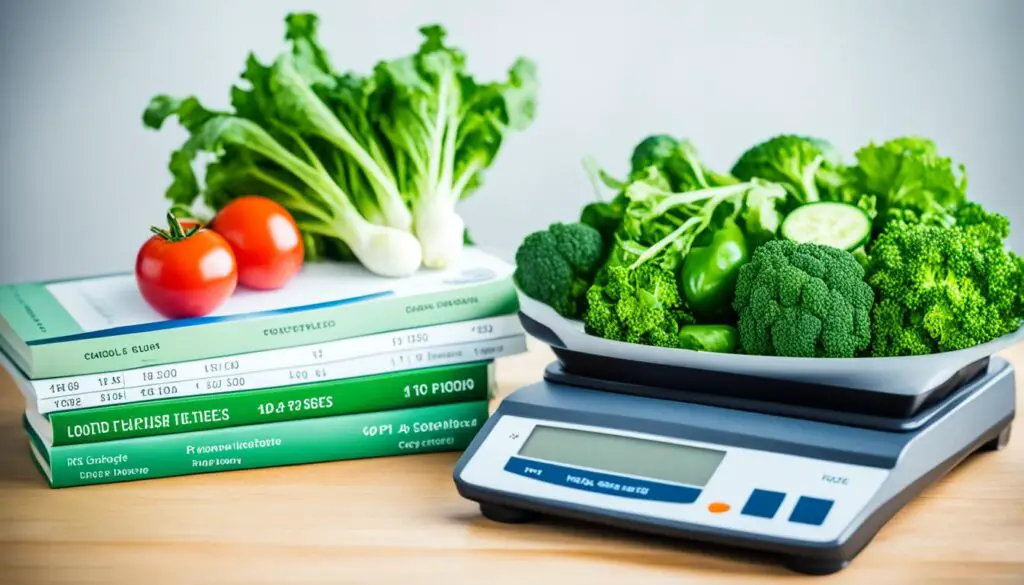
The HCG diet can be adapted for vegetarians, but it requires substantial modifications and diligent planning. As a vegetarian, finding alternative protein sources is essential to meet your protein needs while following the diet. Dairy products like fat-free milk, low-fat cottage cheese, and Greek yogurt, as well as soy products like tofu and tempeh, can provide vegetarian-friendly protein options. Incorporating protein shakes with soy, pea, or rice protein can also help supplement your protein intake.
Tracking your nutrient intake is crucial to avoid potential deficiencies, particularly in iron, zinc, and vitamin B12. Careful meal planning, including a variety of nutrient-rich fruits and vegetables, can help ensure you get the necessary nutrients while on the HCG diet. It’s recommended to consult with a healthcare provider before starting the diet as they can provide guidance and monitor your progress.
Remember, the HCG diet is an extreme weight loss program and should be approached with caution. Once you complete the diet, it’s important to focus on sustainable, balanced eating to maintain your weight loss and support long-term health. Gradually reintroduce foods back into your diet and prioritize a variety of nutrient-dense meals to achieve a healthy lifestyle.
Conclusion
The compatibility between the HCG diet and a vegetarian lifestyle presents certain challenges. The diet’s heavy reliance on lean animal proteins makes it difficult for vegetarians to meet their protein requirements. Additionally, eliminating most vegetarian protein sources can lead to potential nutrient deficiencies. However, with the right modifications and careful planning, vegetarians can successfully adapt the HCG diet to align with their dietary preferences.
Before embarking on any extreme diet, it is crucial to consult with a healthcare professional. They can provide personalized guidance and ensure that the diet is safe and suitable for your specific needs. It’s also important to remember that sustainable weight management requires a long-term approach. After completing the HCG diet, focus on maintaining a balanced and nutritious eating plan to support your overall health and well-being.
The HCG diet may not be recommended by most healthcare providers, particularly for individuals with dietary restrictions. Extreme diets like the HCG diet can pose risks, and it’s essential to prioritize your health and well-being above rapid weight loss. Instead of pursuing drastic measures, consider incorporating more conventional and sustainable approaches to weight management, such as adopting a balanced diet and engaging in regular physical activity.
FAQ
Is the HCG diet compatible with a vegetarian lifestyle?
Yes, with modifications and careful planning, the HCG diet can be adapted to align with a vegetarian lifestyle.
What is the HCG diet?
The HCG diet is a weight loss program that combines HCG supplements or injections with a very low-calorie diet of 500 calories per day.
What are the challenges of following a vegetarian HCG diet?
The main challenges include meeting protein requirements without meat sources and avoiding potential nutrient deficiencies.
What are some vegetarian protein options for the HCG diet?
Vegetarian protein options include dairy products, soy products, and protein powders like soy, pea, or rice protein.
Can you provide sample vegetarian meals for the HCG diet?
Yes, sample vegetarian meals include scrambled egg whites and vegetables for breakfast, edamame salad for lunch, and tofu vegetable stir fry with cauliflower rice for dinner.
How can I make the HCG diet work as a vegetarian?
To make the HCG diet work as a vegetarian, you should track protein intake, plan meals in advance, consider protein shakes if needed, and look for HCG vegetarian recipes.
Is the vegetarian HCG diet recommended?
While some vegetarians may choose to do the HCG diet, most healthcare providers do not recommend it due to the risks posed by the very low-calorie diet and potential nutrient deficiencies.
What is the bottom line for vegetarians considering the HCG diet?
Vegetarians interested in the HCG diet should carefully consider the modifications and diligently plan their meals to meet protein needs and avoid nutrient deficiencies.

